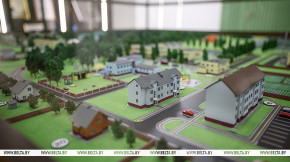Belarus plans to adopt new waste management strategy

20.05.2025
MINSK, 20 May (BelTA) - Belarus plans to adopt a new waste management strategy and appoint a single regulator. These issues were discussed at a meeting presided by Belarusian leader Aleksandr Lukashenko to discuss waste management and utilization of secondary material resources, BelTA learned.
Natural Resources and Environmental Protection Minister Sergei Maslyak reported on the development of an integrated strategy of waste management and use in the country. Aleksandr Lukashenko suggested that the document should envisage more ambitious tasks and warned against dragging out the deadlines for implementation.
"Such a document is ready and has been submitted for public hearing," he stated. The Natural Resources and Environmental Protection Ministry has also established a coordinating council on waste management, which includes representatives of science, business, local authorities and other stakeholders. “We have taken into account all possible remarks,” the minister said. “The strategy has been submitted for public hearing. We receive questions, including from citizens, and we take them into account. In the near future, after finalization, the strategy will be submitted to the government.”
According to Sergei Maslyak, plans are in place to unite other documents on this subject in the new document. “Today, six strategies and four concepts cover waste management issues in the country. It is necessary to accumulate everything in a single document and to give the opportunity to define a single body represented by the Ministry of Natural Resources and Environmental Protection,” he explained the need to develop and adopt a new strategy. “This will yield results in the near future. I will be responsible for these issues.”
One of the main goals of the strategy is to achieve waste recycling rate of at least 90% by 2040.
However, the president took the view that the designated period was too long. "These deadlines are not right. These are our resources, and this waste harms the nature. So we need to recycle waste into resources. Are you suggesting we live among this waste until 2040?" the head of state said.
In this regard, Prime Minister Aleksandr Turchin promised to give momentum to the work to increase the waste processing volumes.
The number one task is to focus major efforts on sorting waste before it goes to landfills, extracting from it all recyclable resources. “If we take all waste as 100%, some 40% can be recycled, turned into secondary material resources. About 30% or a little more is organics. The rest is 20-25% is the waste that is not recyclable today. This is a simple task (and we will do it). We will have no secondary material resources in landfills. We will do it in the near future,” the prime minister said.
“In the near future? In 2040?” Aleksandr Lukashenko asked.
“In the next few years,” Aleksandr Turchin assured.
The operation of the Brest Waste Treatment Plant was discussed as an example. The enterprise collects and sorts waste from Brest, Brest District and Zhabinka District, extracting about 14 types of recyclable materials, including plastic, glass, waste paper, as well as organic waste, which turned into biogas to generate electricity for the needs of the plant.
The new garbage processing plant, which is being built near Minsk and will start operating in July this year, will help solve the task, too. The processing amounts will be about 600,000 tonnes of waste per year.
The plant is expected to become the country's largest RDF (refuse-derived fuel) producer. The capacity is expected to make 113,000 tonnes per year, which, according to experts, allows to largely meet the energy needs of cement plants. However, the cement plants are not so much enthusiastic about the prospect of using RDF, citing various technological difficulties and equipment maintenance.
In this regard, the president urged to instruct the cement plants to use RDF, as it was important for the country and would help solve the issues of both waste processing and supplying the cement industry with local energy resources.
“If this fuel [RDF-fuel] burns well, let them take it,” said Aleksandr Lukashenko. “Set the price and volumes to be taken by these plants. They are state enterprises after all (well, it does not even matter what kind of ownership they are, there should be order in the country). All this idle talk should be stopped.”



